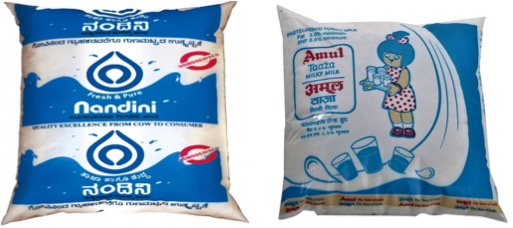Fists have been waved in poll-bound Karnataka, where opposition parties like the Congress and Janata Dal (Secular) have joined pro-Kannada groups in attacking the state’s Bharatiya Janata Party (BJP) government for letting Gujarat’s Amul sell milk and other dairy products there. This, they allege, poses a threat to Nandini, a brand operated by the state’s farmer cooperative, the Karnataka Milk Federation. Even allegations of plans to merge Nandini with Amul are being made, fuelling local protests and boycott calls against Amul as part of a ‘save Nandini’ campaign. Things have gotten so bitter that Jayen Mehta, managing director of Gujarat Cooperative Milk Marketing Federation, which runs Amul, has had to explain the brand’s intentions. Mehta said Amul plans to work with Nandini and not compete against it. This suggests it may seek to scale up its existing association with Nandini, whose resources it uses for Amul ice-cream made in Bengaluru. Mehta also spoke of a plan of selling milk via e-commerce platforms, which could leave Nandini to dominate other channels (as it has long done). But the issue is still on high-flame, with too much politics in the cauldron for all this froth over nothing to settle yet.
Congress leader Rahul Gandhi threw his weight behind his party’s position by visiting a Nandini parlour, where he proclaimed the brand to be Karnataka’s pride and “the best!” Ironically, like the protests Amul is facing in Karnataka, Nandini features in some discontent among dairy farmers in Kerala. As Gandhi was elected in 2019 to the Lok Sabha from this adjoining state, the BJP has been quick to demand that he also speak up for an easy path for Nandini to operate in Kerala. Politically, the Amul-vs-Nandini brouhaha is over whose interests are mostly served by cooperatives sourcing milk from dairy farmers—Gujarat’s or Karnataka’s? But looking upon it as a vote-catcher obscures the fact that all these suppliers are Indian, just as consumers are. Nobody should pitch those of one region against those of another. Such subnationalism violates both the spirit and logic of India’s common market. If state barriers are erected, it would hurt the entire dairy ecosystem. To maximize the final value derived by all stakeholders (chiefly livestock owners), we must not limit any player’s field of opportunity. We should also encourage rivalry, as a better contested market generally tends to offer superior value for money while also enlarging cash flows for inputs. Any brand should be able to sell freely anywhere, be it Amul in Karnataka or Nandini in Kerala.
Subnational political appeals need a rollback. Indeed, we must discourage identity politics in general for the negative economic role it plays. It is ironic that a clash of brands has got spun as a danger. While private brands like Britannia exist, our dairy market has lacked competitive intensity in most parts of India. Unless a player is simply too weak to survive, the spur of rivalry can raise everyone’s game, expand consumption and prove itself a win-win for all. As milk is highly perishable, local suppliers have a supply advantage in every region. To them, it is the overall volumes sourced that matter, not which brand of curd, cheese, etc, their supplies go into. As of now, Amul’s packages are selling at a premium over Nandini’s in Karnataka. If the gap begins to close, the latter should work out a strategic response like any marketer would. Let its rivalrous resilience become the narrative, not the ‘utterly bitterly’ slugfest we’re seeing.
Source : Mint April 20th 2023

